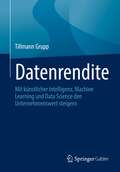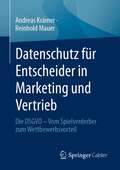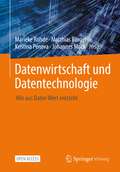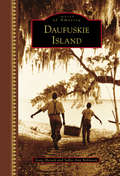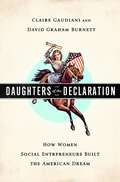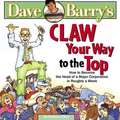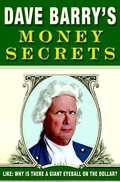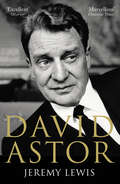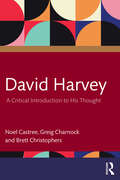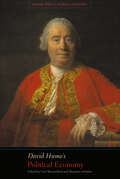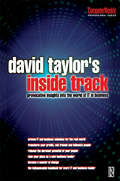- Table View
- List View
Datenrendite: Mit künstlicher Intelligenz, Machine Learning und Data Science den Unternehmenswert steigern
by Tillmann GruppGegenwärtig gibt es einen starken Hype um die Themen künstliche Intelligenz, Machine Learning und Data Science. Doch wie lassen sich datengetriebene Methoden und Technologien nutzen und in Unternehmen gewinnbringend einsetzen? Dieses Buch zeigt praxisnah und anschaulich, wie mit der richtigen Datenbasis und Datenmodellen der Wert von Daten für Unternehmen erschlossen werden kann. Dabei geht es nicht um technische Details zu Algorithmen und Technologien, sondern um Instrumente und sofort anwendbare Lösungen zur erfolgreichen Projektumsetzung.Jedes Kapitel stellt die jeweilige Zielsetzung vor, vermittelt anschließend alle Inhalte und fasst am Ende – neben einer Checkliste der wichtigsten Maßnahmen – die Aussagen für verschiedene Organisationsformen zusammen. Anhand zahlreicher Beispiele wird gezeigt, wie Struktur und Vorgehen den Anforderungen der komplexen Werkzeuge gerecht werden können.
Datenschutz für Entscheider in Marketing und Vertrieb: Die DSGVO – Vom Spielverderber zum Wettbewerbsvorteil
by Andreas Krämer Reinhold MauerDieses Buch sensibilisiert für die konkreten Anforderungen, die mit der DSGVO verbunden sind. Es stellt Hinweise bereit, die helfen sollen, grobe Fehler zu verhindern, aber auch aufzeigen, wie durch ein aktives Management Wettbewerbsvorteile durch Datenschutz erreicht werden können. Die Autoren zielen darauf ab, erstens in knapper und eingängiger Form Transparenz zu den rechtlichen Rahmenbedingungen durch die DSGVO allgemein und speziell in Bezug auf Aktivitäten in Marketing und Vertrieb zu schaffen. Im Hauptteil wird zweitens anhand von ausgewählten Marketing- und Vertriebsaktivitäten aufgezeigt, an welchen Stellen Datenschutzbestimmungen (als limitierender Faktor) wirken und welche Maßnahmen erforderlich sind, um das volle Marketingpotenzial im Kundenkontakt ausschöpfen zu können. Betrachtet werden Marketingaktivitäten, die für Unternehmen zum einen wichtig sind (z. B. unmittelbares Umsatzpotenzial) oder eine direkte Schnittstelle zum Kunden bilden und zum anderen Bereiche, in denen derzeit starke Unsicherheiten bei den Entscheidern in Hinblick auf datenschutzrechtliche Belange bestehen. Diese betreffen die Erfassung, Speicherung und Nutzung von personenbezogenen Daten. Abschließend wird drittens aufgezeigt, wie sich das Thema Datenschutz aus der Rolle eines limitierenden Faktors zu einem Erfolgsfaktor für das Marketing umgestalten lässt. Dazu bieten Checklisten eine komprimierte Orientierungshilfe im operativen Bereich.
Datenwirtschaft und Datentechnologie: Wie aus Daten Wert entsteht
by Marieke Rohde Matthias Bürger Kristina Peneva Johannes MockIn diesem Open-Access-Buch stehen die wirtschaftliche Verwertung von Daten und die dazu gehörenden technischen und organisatorischen Prozesse und Strukturen in Unternehmen im Fokus. Es behandelt Themen wie Datenmonetarisierung, Datenverträge, Data Governance, Informationssicherheit, Datenschutz und die Vertrauenswürdigkeit von Daten.Seit Jahren wird davon gesprochen, dass „Daten das neue Öl“ sind. Expertinnen und Experten sind sich einig: Das Wertschöpfungspotential von Daten ist enorm und das über fast alle Branchen und Geschäftsfelder hinweg. Und dennoch bleibt ein Großteil dieses Potentials ungehoben. Deshalb nimmt dieser Sammelband konkrete Innovationshemmnisse, die bei der Erschließung des wirtschaftlichen Werts von Daten auftreten können, in den Blick. Er bietet praktische Lösungsansätze für diese Hürden an den Schnittstellen von Ökonomie, Recht, Akzeptanz und Technik. Dazu folgen die Autorinnen und Autoren einem interdisziplinären Ansatz und greifen aktuelle Diskussionen aus der Wissenschaft auf, adressieren praxisnahe Herausforderungen und geben branchenunabhängige Handlungsempfehlungen. Den Leserinnen und Lesern soll eine transparente Informationsbasis angeboten werden und damit die Teilnahme an der Datenwirtschaft erleichtert werden. Dieses Buch richtet sich an Entscheidungsträgerinnen und Entscheidungsträger in Unternehmen sowie an Entwicklerinnen und Entwickler datenbasierter Dienste und Produkte. Der Band ist ebenfalls für Fachkräfte der angewandten Forschung wie auch für interdisziplinär Studierende z.B. der Wirtschaftsinformatik, der technikorientierten Rechtswissenschaft oder der Techniksoziologie relevant.
Dating Ring
by Lindsay N. Hyde Thomas R. EisenmannIn 2015, the co-founders of Dating Ring, an online dating startup that relied on human matchmakers to arrange dates between its members, were deciding whether to either shut down the service or instead manage Dating Ring as a "lifestyle company," ramping down growth expectations, abandoning plans to raise more venture capital, and keeping tight control over costs. Dating Ring's founders originally aimed to achieve a billion dollar valuation, and their participation in the elite Y Combinator accelerator has stoked their ambitions. However, growth had subsequently sputtered and the founders had not been able to raise more venture capital.
Daufuskie Island: Smokin' Joe Butter Beans, Ol' 'fuskie Fried Crab Rice, Sticky-bush Blackberry Dumpling, And Other Sea Island Favorites (Images of America)
by Jenny Hersch Sallie Ann RobinsonDaufuskie, a Muscogee word meaning "sharp feather" or "land with a point," is an island located between Hilton Head and Savannah, bounded by the Calibogue Sound and the Cooper River. With no bridge to the mainland, the island maintains a distinct allure. Home to Native American tribes, a paradise for pirates, and a strategic military outpost, Daufuskie held enslaved Africans brought by plantation owners as chattel to build their wealth. After the Civil War and occupation by Union soldiers, freed slaves from the Sea Islands and surrounding states settled on Daufuskie as landowners and sharecroppers. Daufuskie's population fluctuated in keeping with local industries, and those who stayed often relied on farming, hunting, and fishing to survive. Electricity was brought to the island in the early 1950s, and the first telephone rang in 1972. Today, historic sites, restaurants, outdoor recreation, and scenic beauty draw visitors and residents to this unique community. Daufuskie Island is part of the National Park Service's Gullah Geechee Cultural Heritage Corridor and is listed in the National Register of Historic Places.
Daughters of the Declaration: How Women Social Entrepreneurs Built the American Dream
by Claire Gaudiani David Graham BurnettAmericaOCOs founding fathers established an idealistic framework for a bold experiment in democratic governance. The new nation would be built on the belief that oall men are created equal, and are endowed. . . with a right to life, liberty, and the pursuit of happiness. OCO The challenge of turning these ideals into reality for all citizens was taken up by a set of exceptional American women. Distinguished scholar and civic leader Claire Gaudiani calls these women osocial entrepreneurs, OCO arguing that they brought the same drive and strategic intent to their pursuit of othe greater goodOCO that their male counterparts applied to building the nation's capital markets throughout the nineteenth century. Gaudiani tells the stories of these patriotic women, and their creation of America's unique not-for-profit, or osocial profitOCO sector. She concludes that the idealism and optimism inherent in this work provided an important asset to the increasing prosperity of the nation from its founding to the Second World War. Social entrepreneurs have defined a system of governance oby the people, OCO and they remain our best hope for continued moral leadership in the world.
Dave and Millie: A Tale of Two Entrepreneurs
by Ann Leamon G. Felda HardymonTwo entrepreneurs have just been told by their venture capital backer to prepare a list of possible cuts to help them weather the 2008-2009 economic downturn. The impact on each firm is very different: one is a later-stage company with revenues in excess of $100 million; the other a pre-revenue company trying to raise its first institutional round. The entrepreneurs must consider their options and the impact on their companies' growth and, perhaps, survival.
Dave Armstrong (A)
by George WuA second-year Harvard MBA student considers the pros and cons of three job offers. He identifies several concerns and evaluates each job in terms of how well they meet these concerns. He assesses probabilities for whether the jobs will be successful for him.
Dave Barry's Claw Your Way To The Top: How To Become The Head Of A Major Corporation In Roughly A Week
by Dave Barry Jerry O'BrienWorking up the corporate ladder is all well and good for most people, but you are not "most people." You are a highly motivated individual who wants to be on the fast track, and you cannot afford to fritter away valuable time working diligently and competently on the job. You need Dave Barry's surefire tips in Claw Your Way to the Top!<P> * "A good resume is more than just a piece of paper. It can mean the difference between not getting a job and not even coming close."<P> * "Can you get a job in business? Heck yes! Don't you listen to those Negative Nellies who tell you there aren't any good jobs anymore, just because the steel, automobile, shoe, clothing, railroad, and agricultural industries have all collapsed!"<P> * "I don't mean to suggest for a moment that all it takes to be a top executive is a custom-tailored European suit. You also need the correct shirt and tie."<P> * "Remember, your subordinates are not machines. They are human beings with the same dreams as you. OK, maybe not all the same dreams. Probably they don't have the one where you're naked in a vat of Yoo-Hoo with the Soviet gymnastics team."<P> * "Ask any business school professor, and he'll tell you a good memo is clear, concise, and well-organized. Now ask him what his annual salary is. It's probably less than most top executives spend in a month on shoe maintenance."
Dave Barry's Money Secrets: Like: Why Is There a Giant Eyeball on the Dollar?
by Dave BarryDid you ever wish that you really understood money? Well, Dave Barry wishes that he did, too. But that hasn't stopped him from writing this book. In it, Dave explores (as only he can) such topics as: * How the U. S. economy works, including the often overlooked role of Adam Sandler * Why it is not a good idea to use squirrels for money * Strategies that will give you the confidence you need to try for a good job, even though you are--let's be honest--a no-talent loser * How corporate executives, simply by walking into their offices, immediately become much stupider * An absolutely foolproof system for making money in the stock market, requiring only a little effort (and access to time travel) * Surefire tips for buying and selling real estate, the key being: Never buy--or, for that matter, sell--real estate * How to minimize your federal taxes, safely and legally, by cheating * Why good colleges cost so much, and how to make sure your child does not get into one * How to reduce the cost of your medical care by basically not getting any * Estate planning, especially the financial benefits of an early death * And many, many pictures of Suze Orman But that's only the beginning! Dave has also included in this book all of the important points from a book written by Donald Trump, so you don't have to read it yourself. Plus he explains how to tip, how to negotiate for everything (including bridge tolls), how to argue with your spouse about money, and how much allowance to give your children (three dollars is plenty). He also presents, for the first time in print anywhere, the Car Dealership Code of Ethics ("Ethic Seven: The customer is an idiot"). Also, there are many gratuitous references to Angelina Jolie naked. You can't afford not to buy this book! Probably you need several copies. What kind of financial shape are you in right now? This scientific quiz will show you. Be honest in your answers: If you lie, you'll only be lying to yourself! The place to lie is on your federal tax return. What is your annual income? 1. More than $50,000. 2. Less than $50,000. 3. However much I get when I return these empties. Not counting your mortgage, how much money do you currently owe? 1. Less than $10,000. 2. More than $10,000. 3. Men are threatening to cut off my thumbs. How would you describe your portfolio? 1. Conservative, mainly bonds and blue-chip equities. 2. Aggressive, mainly options and speculative stocks. 3. My what? When analyzing an investment, what do you consider to be the most important factor? 1. The amount of return. 2. The degree of risk. 3. The name of the jockey. How do you plan to finance your retirement? 1. Savings. 2. Social security. 3. Sale of kidneys. --from the Introduction: "Why You Need This Book".
Dave Ramsey's Financial Peace University
by Dave RamseyDave Ramsey's Financial Peace University This Is Where It All Begins
Dave Ramsey's Financial Peace University Workbook (Workplace Edition)
by Dave RamseyLearn practical steps to beat debt, take control of your money, build wealth, give generously, and secure your family's future!
David Astor
by Jeremy LewisFew newspaper editors are remembered beyond their lifetimes, but David Astor of the Observer is a great exception to the rule. He converted a staid, Conservative-supporting Sunday paper into essential reading, admired and envied for the quality of its writers and for its trenchant but fair-minded views. Astor grew up at Cliveden, the country house on the Thames which his grandfather had bought when he turned his back on New York, the source of the family fortune. His liberal-minded father was a constant support, but his relations with his mother, Nancy, were always embattled. At Oxford he suffered the first of the bouts of depression that were to blight his life; a lost soul for much of the Thirties, he became involved in attempts to put the British Government in touch with the German opposition in the months leading up to the war. George Orwell had urged Astor to champion the decolonisation of Africa, and Nelson Mandela always acknowledged how much he owed to the Observer’s long-standing support. A generous benefactor to good causes, he helped to set up Amnesty International and Index on Censorship. A good man and a great editor, he deserves to be better remembered.
David Berman
by Ananth Raman Vishal Gaur Saravanan KesavanExamines the decision of a hedge fund manager who is considering investing in a retail stock. The protagonist is concerned about the retailer's inventory level. Explores the relationship between the retailer's inventory and future earnings--and, hence, the relationship between inventory level and stock price.
David Crane's Clean(er) Energy Strategy at NRG
by George Serafeim Michael W. Toffel Tom QuinnIn 2015, David Crane was the CEO of NRG, the second-largest energy producer in the United States. NRG got most of its power from fossil fuels, but Crane - hired as CEO in 2003 as NRG emerged from bankruptcy - had invested heavily in alternative energy, loudly proclaiming the business benefits of being a leader on climate change. But by 2015, facing investor and board pressure, Crane was forced to spin off NRG's renewable assets, marking the end of his bold strategy.
David Dao on United Airlines
by Jenny Sanford Benjamin EdelmanIn widely-circulated videos, United staff and Chicago security forcibly remove a passenger from his paid seat on an aircraft, injuring him severely. United leadership must decide how to respond to public outcry.
David Doesn't Delegate: Overcoming an Individual's Immunity to Change
by Lisa Laskow Lahey Robert KeganAs any experienced manager will tell you, being an effective delegator is crucial to using everyone's time, skills, and knowledge appropriately. Without it, today's talents go underdeployed, tomorrow's talents go undeveloped, and some people--especially ineffective delegators themselves--get overused or burned out. Many practical guides, however, treat delegation as a technical challenge, or one with tried and true solutions and methodologies, when for most people, delegation is actually an adaptive challenge. This chapter looks at how one manager tackled the delegation challenge, overcoming his immunity to change. This chapter is excerpted from "Immunity to Change: How to Overcome It and Unlock the Potential In Yourself and Your Organization."
David Fletcher
by Linda A. Hill Melinda B. ConradDavid Fletcher, manager of the Emerging Growth Fund at a New York investment management firm, decides to assemble a team of analysts to which he can delegate part of his workload. The case explores the challenges of being a producing manager and Fletcher's efforts to select and manage a team of professionals.
David Harvey: A Critical Introduction to His Thought
by Noel Castree Greig Charnock Brett ChristophersDavid Harvey is among the most influential Marxist thinkers of the last half century. This book offers a lucid and authoritative introduction to his work, with a structure designed to reflect the enduring topics and insights that serve to unify Harvey’s writings over a long period of time. Harvey’s writings have exerted huge influence within the social sciences and the humanities. In addition, his work now commands a global readership among Left political activists and those interested in current world affairs. Harvey’s central preoccupation is capitalism and the impacts of its growth-obsessed, contradictory dynamics. His name is synonymous with key analytical concepts like ‘the spatial fix’ and ‘accumulation by dispossession’. This critical introduction to his thought is an essential companion for both new and more experienced readers. The critique of capitalism is one of the most important undertakings of our time, and Harvey’s work offers powerful tools to help us see why a ‘softer’ capitalism is insufficient and a post-capitalist future is necessary. This book is an important resource for scholars and graduate students in geography, politics and many other disciplines across the social sciences and humanities.
David Hume's Political Economy
by Margaret Schabas Carl WennerlindHume‘s Political Discourses (1752) won immediate acclaim and positioned him as an authoritative figure on the subject of political economy. This volume of thirteen new essays definitively establishes the central place of political economy in Hume‘s intellectual endeavor, as well as the profound and far-reaching influence of his theories on Enlighte
David Neeleman: Flight Path of a Servant Leader (A)
by Matthew D. Breitfelder William W. GeorgeDavid Neeleman, founder of JetBlue, is forced to confront a crisis in customer confidence following operational difficulties on February 14, 2007. This becomes a vital test of his leadership.
David Neeleman: Flight Path of a Servant Leader (B)
by Matthew D. Breitfelder William W. GeorgeDavid Neeleman (B) traces the events subsequent to the (A) case.
David Ricardo
by John E. KingThis book offers a new account of David Ricardo's political economy that is both scholarly and accessible. It provides a detailed overview of the secondary literature on Ricardo down to 2012, and discusses alternative perspectives on his work, including those of Marxians, neoclassicals and Sraffians.
David Ricardo. An Intellectual Biography (Routledge Studies in the History of Economics)
by Sergio CremaschiDavid Ricardo has been acclaimed – or vilified – for merits he would never have dreamt of, or sins for which he was entirely innocent. Entrenched mythology labels him as a utilitarian economist, an enemy of the working class, an impractical theorist, a scientist with ‘no philosophy at all’ and the author of a formalist methodological revolution. Exploring a middle ground between theory and biography, this book explores the formative intellectual encounters of a man who came to economic studies via other experiences, thus bridging the gap between the historical Ricardo and the economist’s Ricardo. The chapters undertake a thorough analysis of Ricardo’s writings in their context, asking who was speaking, what audience was being addressed, with what communicative intentions, using what kind of lexicon and communicative conventions, and starting with what shared knowledge. The work opens in presenting the different religious communities with which Ricardo was in touch. It goes on to describe his education in the leading science of the time – geology – before he turned to the study of political economy. Another chapter discusses five ‘philosophers’ – students of logic, ethics and politics – with whom he was in touch. From correspondence, manuscripts and publications, the closing chapters reconstruct, firstly, Ricardo's ideas on scientific method, the limits of the 'abstract science’ and its application, and, secondly, his ideas on ethics and politics and their impact on strategies for improving the condition of the working class. This book sheds new light on Ricardian economics, providing an invaluable service to readers of economic methodology, philosophy of economics, the history of economic thought, political thought and philosophy.
David Taylor's Inside Track: Provocative Insights into the World of IT in Business (Computer Weekly Professional Ser.)
by David TaylorNever before has IT played such a significant role in transforming organisations, of all sizes. And yet it continues to be dominated by technical jargon, acronyms and irrelevant detail. This book cuts through all of the confusion, and presents a clear, direct, solution based focus on the key IT/business issues facing every company and business leader today.This book contains the complete, first fifteen months of David Taylor's highly acclaimed Computer Weekly column - Inside Track. With a reputation for cutting through the hype, David focuses on the IT/business and personal leadership agenda, covering such issues as:* The key IT issues for the boardroom - in business language* Actions to win in the new world of e-commerce - and get started today* The successful new IT leader - the skills you and your company need toemploy* Quick solutions to long-term IT problems - they can be resolved* How to motivate your people, and slash staff turnover - save a fortune onrecruitment costs* True IT/business alignment - add real value to your bottom lineDavid Taylor is a leading authority on IT in business. He is President of the association of IT Directors, Certus, a reference partner to the UK Government's National Audit Office, and a registered expert with several global research companies. His overall aim is to enable people and organisations to be all that they can be, through the combination of world class technology, true leadership and the release of human potential. With a prestigious background across companies such as Rolls-Royce, Allianz and Cornhill, David has a driving, positive passion for IT in business, and a reputation for championing IT Directors who want to achieve board level positions in their organisations. David and his team work with FTSE 200 companies on winning in the new internet economy, with entrepreneurs starting new dot com ventures, and with CEOs, advising on the qualities they should seek in their IT leaders. A regular writer, television presenter and speaker, David gives keynote, leadership and IT presentations throughout the world. He lives with his wife, Rosalind and their two children, Anthony and Olivia, in Surrey.
